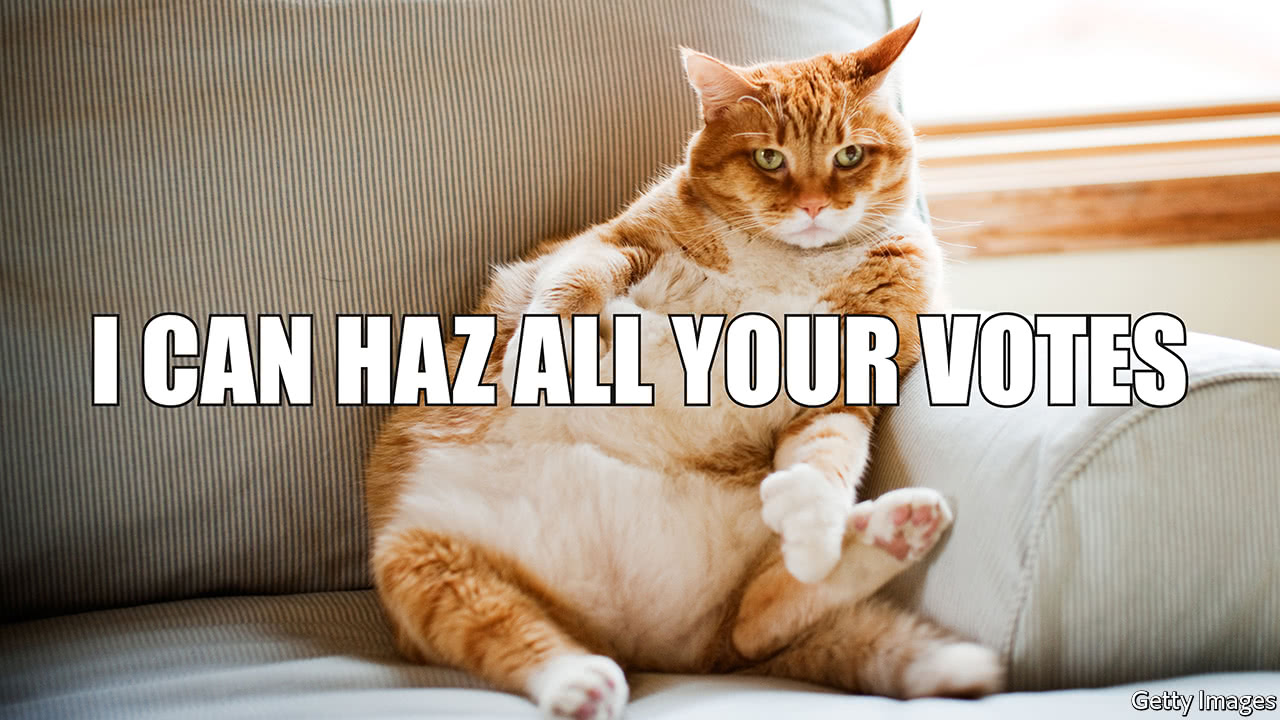
“Come on guys, let’s be serious. If you really want to do something, don’t just ‘like’ this post. Write that you are ready, and we can try to start something.”
Mustafa Nayem, a Ukrainian journalist, typed those words into his Facebook account on the morning of November 21st 2013. Within an hour his post had garnered 600 comments. That prompted Mr Nayem to write again, calling on his followers to gather later that day on the Maidan square in Kiev. Three months later Ukraine’s president, Viktor Yanukovych, was removed.
At the time, this did not seem all that remarkable. From the protests around the Iranian elections of 2009 onwards, the role of Facebook and Twitter in political uprisings in dodgy countries had been prominent and celebrated.
At the time, this did not seem all that remarkable. From the protests around the Iranian elections of 2009 onwards, the role of Facebook and Twitter in political uprisings in dodgy countries had been prominent and celebrated.
The social-media-fuelled movements often failed, in the end, to achieve much; five months before Mr Nayem put up his post the army had reestablished its power in Egypt, where social media had been crucial to the downfall of General Hosni Mubarak in 2011. But the idea had taken hold that, by connecting people and giving them a voice, social media had become a global force for plurality, democracy and progress.
A few months after the “Euromaidan” protests brought down Mr Yanukovych, a less widely noticed story provided a more disturbing insight into the potential political uses of social media.
A few months after the “Euromaidan” protests brought down Mr Yanukovych, a less widely noticed story provided a more disturbing insight into the potential political uses of social media.
In August 2014 Eron Gjoni, a computer scientist in America, published a long, rambling blog post about his relationship with Zoe Quinn, a computer-game developer, appearing to imply she had slept with a journalist to get favourable coverage of her new game, “Depression Quest”.
The post was the epicentre of “Gamergate”, a misogynistic campaign in which mostly white men keen to bolster each other’s egos let rip against feminists and all the other “social justice warriors” they despised in the world of gaming and beyond. According to some estimates, more than 2m messages with the hashtag #gamergate were sent in September and October 2014.
The campaign used the entire spectrum of social-media tools. Videos, articles and documents leaked to embarrass enemies—a practice known as doxing—were posted to YouTube and blogs. Twitter and Facebook circulated memes.
The campaign used the entire spectrum of social-media tools. Videos, articles and documents leaked to embarrass enemies—a practice known as doxing—were posted to YouTube and blogs. Twitter and Facebook circulated memes.
Most people not directly involved were able to ignore it; crucially, the mainstream media, when they noticed it, misinterpreted it. They took Gamergate to be a serious debate, in which both sides deserved to be heard, rather than a right-wing bullying campaign.
Looking at the role that social media have played in politics in the past couple of years, it is the fake-news squalor of Gamergate, not the activist idealism of the Euromaidan, which seems to have set the tone.
Looking at the role that social media have played in politics in the past couple of years, it is the fake-news squalor of Gamergate, not the activist idealism of the Euromaidan, which seems to have set the tone.
In Germany the far-right Alternative for Germany party won 12.6 percent of parliamentary seats in part because of fears and falsehoods spread on social media, such as the idea that Syrian refugees get better benefits than native Germans. In Kenya weaponized online rumors and fake news have further eroded trust in the country’s political system.
This is freaking some people out.
This is freaking some people out.
In 2010 Wael Ghonim, an entrepreneur and fellow at Harvard University, was one of the administrators of a Facebook page called “We are all Khaled Saeed”, which helped spark the Egyptian uprising centEred on Tahrir Square.
“We wanted democracy,” he says today, “but got mobocracy.” Fake news spread on social media is one of the “biggest political problems facing leaders around the world”, says Jim Messina, a political strategist who has advised several presidents and prime ministers.
To read the rest of the article, click on link:
http://www.economist.com/news/briefing/21730870-economy-based-attention-easily-gamed-once-considered-boon-democracy-social-media?frsc=dg%7Ce





2 comments:
Mobs like Antifa, Black Lives Matter and others use social media to recruit and for propaganda. Antifa has used social media to tell the nation that on Nov. 4 they plan mob actions in many cities, especially cities with large minority populations....hoping that locals in those cities will make the Antifa mob larger and more dangerous. These terrorist and anarchist groups send out their messages of hate via social media.
Pendejo
Post a Comment